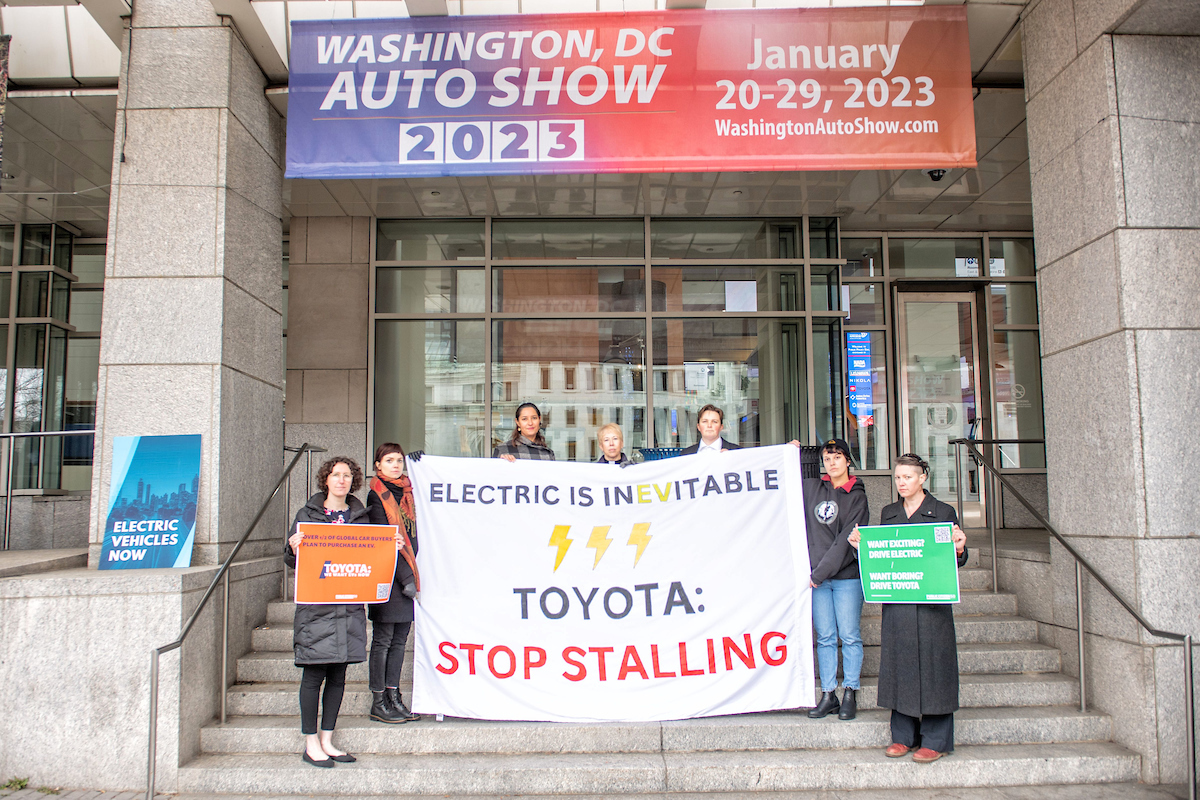Why Toyota shareholders should worry about the company’s electric vehicle opposition
Shareholders propose new efforts to push the automaker into the zero-emission future
By East Peterson-Trujillo

Over the past few years, Toyota has more than earned the reputation of ‘laggard’ when it comes to the zero-emission vehicle transition. The company has been ranked by InfluenceMap as the automaker with the worst impact on climate policy globally for the last two years.
Here are some of the reasons why:
- Toyota joined a Trump-era lawsuit to strip the state of California of its ability to set its own vehicle emissions standards–a position the company only walked back in Aug, 2022.
- When President Biden first took office, Toyota joined a group of automakers in urging the President to implement a weakened version of tailpipe emissions standards that Trump had gutted, instead of restoring them to their pre-Trump strength. Toyota had also supported Trump’s weakened clean air rules.
- In early 2022, Toyota threatened to cease manufacturing cars in the U.K. if the country wouldn’t water down its strong clean car rules, which end diesel sales by 2030 and hybrid sales by 2035. The auto giant backed off after a newspaper exposed the threat.
- Last summer, Japan’s government was set to phase out the sale of combustion engine vehicles by 2035, but at the last minute, the CEO of Toyota Motor Company met with government officials and intervened to ensure that they did not fully ban fossil-fueled cars.
- Toyota opposed federal legislation that would have expanded EV tax credits to provide an additional $4,500 for EVs assembled in union facilities in the U.S.
Now, for the first time ever, Toyota will face a climate-related push from its shareholders at the company’s annual general meeting (AGM) on June 14th.
The proposal asks Toyota to fully disclose its lobbying activity related to climate policy.
As soon as the shareholder resolution was public, Toyota’s board asked all other shareholders to vote against it.
Toyota’s opposition to this simple transparency measure raises the question of what it fears about investors and the public learning more about its lobbying.
Shareholders who submitted the resolution are, in fact, looking out for Toyota’s bottom line. If the company were focused on its survival, it would pay attention to surging demand for EVs: over 50% of car buyers globally want their next car to be electric.
EV-curious Toyota customers are fleeing to competitors like Ford, Hyundai, and Tesla that have existing EV lineups. Toyota debuted its only electric vehicle in the U.S. in 2022, but promptly recalled it because the wheels were falling off.
Toyota is on track to produce 63 million more combustion engine vehicles than is feasible to keep global heating under 1.5°C, per a Greenpeace report.
Instead of building the EVs that consumers want, Toyota is wasting resources fighting zero-emission vehicle policies.
Toyota seems to forget that the UK, EU, and eight U.S. states have banned the sale of fossil-fueled vehicles by 2035. It will have to follow those rules. In 2020, the EPA found out Toyota cheated on emissions testing and fined the company a record $180 million for violating clean air regulations.
New CEO Koji Sato could represent a true turnaround for Toyota. In January, the founder’s grandson Akio Toyoda stepped down as CEO, saying he “need[ed] to take a step back in order to let young people enter the new chapter of what the future of mobility should be like.”
Mr. Toyoda’s opposition to swift adoption of EVs is well-documented. Yet he does not plan to leave the company: he hopes to move to the role of Board Chair—one for which he’ll have to be confirmed by shareholders as well.
To preserve independence of Toyota’s board, proxy adviser Glass Lewis has recommended that shareholders oppose Akio Toyoda’s nomination.
California and New York City’s public pension systems have already submitted votes against Akio Toyoda’s confirmation, in advance of the meeting. They also voted in favor of the climate lobbying-disclosure resolution.
As the new CEO, Koji Sato has said he’ll “accelerate the development of battery electric vehicles.” But so far, he has refused to establish a timeline to end the production of polluting combustion engine vehicles.
The transparency some Toyota shareholders are seeking might just compel Toyota to align its lobbying and policies with science-based climate goals—a very welcome change.